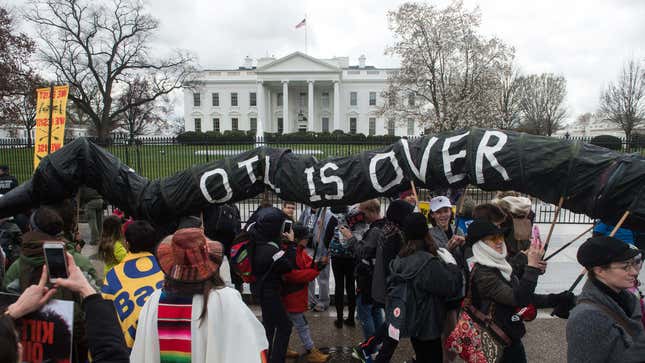
Climate justice activists have had an ecstatic start to the week. In a 24-hour period, three major planned fossil fuel pipelines were delayed or possibly cancelled altogether: Developers cancelled the Atlantic Coast Pipeline on Sunday, a court ordered the Dakota Access Pipeline be cancelled on Monday, and just hours later, the U.S. Supreme Court upheld a federal judge’s rejection of a crucial permit for the Keystone XL Pipeline.
But while rejecting the Keystone XL permit is a big win, the latter decision is not a complete success for the climate justice movement because the Supreme Court also ruled that as many as 70 pipelines can proceed.
The permit in question in the high court’s decision, known as Nationwide Permit 12, is a key requirement for oil and gas pipelines in the U.S. It allows them to be built across waterways. The court’s order held up a Montana judge’s April ruling that federal officials violated the Endangered Species Act by issuing the permit to Keystone XL without a complete properly assessing the impact on it could have on wildlife. That means most of the construction of the massive project will be delayed until at least 2021.
“It’s a major setback, and we’re happy about it, absolutely,” Dallas Goldtooth, who leads the Keep It in the Ground Campaign of the Indigenous Environmental Network, told Earther speaking about the Keystone XL part of the ruling.
But at the same time, the court cleared the use of the Nationwide Permit 12 for some 70 other pipelines, allowing their construction to continue. Politico notes these are mostly minor pipelines, making like easier for oil and gas companies. The fossil fuel industry’s biggest trade group certainly seems happy about it.
These dozens of other pipelines could still face challenges in lower courts, and climate activists’ win regarding Keystone XL—as well as the recent setbacks to the Atlantic Coast Pipeline and the Dakota Access Pipeline—could encourage the movement to levy more lawsuits and ramp up public pressure to end all fossil fuel pipeline projects. Successes in legal challenges to these major pipelines could also help plaintiffs challenging other ones to win more suits and thereby block more pipelines, with Goldtooth noting the value of “a growing number of precedents.”
“Momentum is definitely trending against pipeline companies and for the people,” Ryan Schleeter, senior communications specialist with Greenpeace USA, told Earther.
Still, it would be better for the movement to not have to issue these challenges on a case-by-case basis. It’s clear we must stop constructing any new pipelines or other fossil fuel infrastructure—in fact, we’re long overdue to do so. Ultimately, federal and state governments need to come up the with more overarching limits on construction—or better yet, all-out bans—which will be necessary to limit the damage to the local environment and communities as well as the climate.
“I really, really hope that we see a long standing fix,” said Goldtooth. “I really hope that we see the fallacies of dependence on fossil fuel infrastructure ... and that we really move towards renewable sustainable energy.”